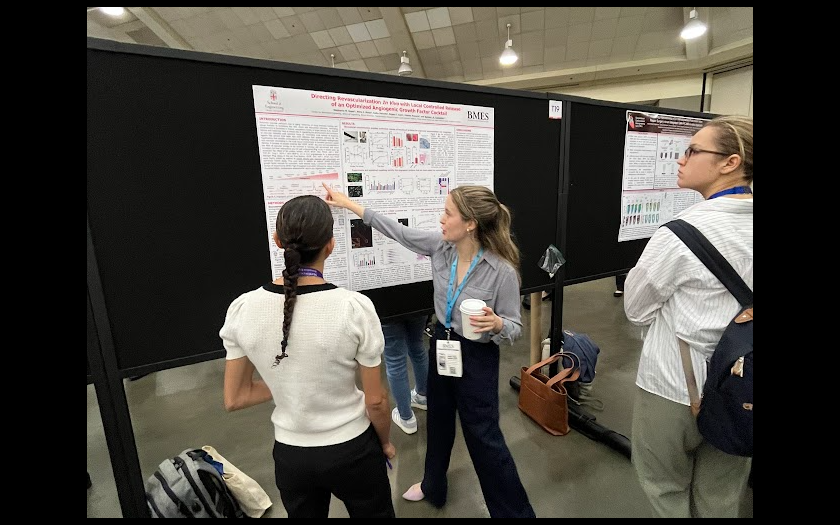How to Maximize Your Conference Experience: Brown BMES Attendees Share Their Advice

Stephanie Roser, one of our BME Ph.D. students, delivering a poster presentation at BMES.
Scientific conferences can be intimidating — especially ones like the Biomedical Engineering Society’s (BMES) Annual Meeting, which often has over 5,000 attendees.
Brown sent a large team of researchers, professors, and students to BMES this year. “It can definitely be overwhelming, especially if it’s your first conference, because it is so big,” said Stephanie Roser, a Ph.D. student who attended the conference for the second time this year.
But there are ways to make navigating presentations, speaker sessions, social events, and networking opportunities “a little bit more digestible,” Stephanie said.
How to Choose What Events to Attend
Conferences like BMES are large and often have several events going on simultaneously. Stephanie recommended that attendees read through the titles of events and speaker sessions ahead of time.
Talks at BMES were grouped by room and time slot into sessions. Ph.D. student Lily Cordner said it’s easier to pick one room and stick to it for each given time slot. “Try to identify sessions that have the most talks that interest you,” she said. “Even if you’re not interested in all the talks, it’s going to be better to stay in that one room.”
The talks in each session run back-to-back and not every room operates on the same schedule, Lily said. As a result, “trying to go around and hit everything” is “not really possible,” Stephanie said.
At BMES, an app outlined the full conference schedule ahead of time. Lily used the app to search for keywords that aligned with her research interests and found a list of posters and speakers that connected with those topics. “That was a way that I stayed organized,” she said.
Undergraduate student Trinity Williams said she would encourage attendees to “fully take advantage of the diverse research presentation sessions offered” and attend sessions on “ a range of topics to broaden your knowledge and spark new ideas.”
How to Give Your First Presentation
Giving poster and oral presentations can be initially intimidating, but it’s “a valuable opportunity to showcase your dedication, and it’s a chance to learn and grow,” Trinity explained.
When presenting in any format, postdoctoral student Dr. Hyeontae Jeong said it’s crucial to remember “the audience is not an expert like you.” It’s important to use simple terms and explain your research in clear, digestible language, he said.
Lily presented a poster at BMES and said that, in general, “less words are better.” She encouraged presenters to think from the perspective of an attendee walking around and quickly deciding what posters to learn more about.
“You don’t want to try to stop and read a small font,” Lily said. “You want to look at the pretty pictures.” Dr. Jeong added that visual aids also effectively explain your work to an unfamiliar audience.
While it’s easy to take it personally when people aren’t interested in stopping to talk about your poster, Lily said it’s important to remember that “there’s just so much going on” at the conference. When people stop to ask questions, they’ll often spark you to think about your research in new ways, she said.
How to Take Advantage of Networking Opportunities
Large conferences offer great chances to connect with fellow scientists and students. “Networking is key,” said Trinity. “Make sure to actively engage in conversations with peers and professionals to build meaningful connections.”
Ph.D. student Alec McCall encouraged undergraduate students to bring their C.V.s or resumes to try and connect with future Principal Investigators. Stephanie said “talking to (current) students in the labs” is a great way for undergraduates to settle on a graduate program.
At BMES, a dedicated room was filled with booths manned by representatives from schools across the country. Universities also could host reception rooms with food, beverages, and forums for students to connect. Stephanie said it is “wildly beneficial to go up to all the tables and go into the rooms of different schools” and talk to various people from different institutions.
Dary Chheng, Program Coordinator at Brown’s Institute for Biology, Engineering, and Medicine, managed Brown’s booth at BMES. She fielded questions about various topics from Research Experiences for Undergraduates to the structure of Brown’s Ph.D. program. She said that “all kinds of people” came up to the booth and took advantage of the opportunity to ask anything and everything about what Brown has to offer.